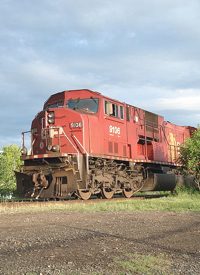
Despite President Obama’s rejection of the Keystone XL Pipeline, millions of barrels of oil will still be making their way from Canada to Gulf refineries, though it will be by way of railroad. According to Fox News, “The amount of oil Canadian Pacific Railway carries down through the heartland has surged 2,500 percent since 2009, to 8.5 million barrels per year from just 325,000.” That number is expected to jump to 45 million barrels per year by 2020.
“We are responding to a growing demand,” Canadian Pacific spokesman Ed Greenberg commented. “There has been unprecedented growth in the energy industry.”
Rep. Fred Upton (R-Mich.), chairman of the House Energy and Commerce Committee, points to the growth of oil delivery via rail, asserting it highlights the missed opportunity of the Keystone Pipeline.
“We need to be doing all we can to develop our resources, particularly now, with rising gasoline prices and the threat of supply disruptions overseas,” Upton asserts. “Most observers acknowledge that rail transport is the best option we currently have to get this oil down to the refineries -— but the Keystone XL pipeline presents us with a better alternative.”
The Canadian Pacific is the alternative to what an expansion of the Keystone Pipeline had hoped to achieve. But the proposed expansion to the pipeline was the source of fierce controversy before it was ultimately rejected by the Obama administration. Opponents raised environmental concerns regarding the pipeline expansion, while supporters argued it would reduce the price of oil, as well as bring jobs to the United States.
President Obama claimed that he rejected the permit to expand the pipeline because Republicans ordered an early deadline, giving him insufficient time to review the plan.
“The rushed and arbitrary deadline insisted on by congressional Republicans prevented a full assessment of the pipeline’s impact, especially the health and safety of the American people, as well as our environment,” the President claimed in a statement.
“This announcement is not a judgment on the merits of the pipeline, but the arbitrary nature of a deadline that prevented the State Department from gathering the information necessary to approve the project and protect the American people,” Obama charged. “I’m disappointed that Republicans in Congress forced this decision, but it does not change my administration’s commitment to American-made energy that creates jobs and reduces our dependence on oil.”
Naturally, Obama’s decision provoked the ire of Republicans and groups such as the U.S. Chamber of Commerce. But while the presidential rejection of the Keystone Pipeline expansion permit did impose a setback, it did not destroy the project entirely, because several permits had already been approved prior to that decision. Likewise, any pipelines that stay within U.S. borders do not require presidential approval.
Meanwhile, petroleum industry analyst Michael Ervin contends that use of the railways is an appropriate alternative for now.
“The use of rail as a short-term solution to pipeline capacity limitations was a likely approach either with or without the additional production,” Ervin said. “It is more a matter of a lack of pipeline capacity, which in turn is depressing domestic crude oil prices of all types in the Midwest and Canada as well.”
Still, according to oil experts, using the railroad instead of the pipeline will add approximately $5-10 to the price of a barrel. And it is expected that the railroad will not be able to transport the same capacity of oil as the pipeline.
But transportation and railroad industry analyst Tony Hatch indicates that railroad oil transport is inevitable, and that oil companies are already investing their own money into rail tankers. He contends that even if the Keystone Pipeline permit is ultimately approved, rail transport will remain a vital component of oil transport.
“The markets are ready for the oil now,” said Hatch. “It’s clear that they are investing in rail even when and if a pipeline is built.”
Transporting oil via railroad may at minimum please environmentalists who orchestrated mass opposition to the Keystone pipeline, asserting it would pollute drinking water and add to greenhouse-gas emissions.
Following President Obama’s rejection of the pipeline, Frances Beinecke, president of the Natural Resources Defense Council, said, “President Obama put the health and safety of the American people and our air, lands and water — our national interes — above the interests of the oil industry.”
But according to Dale Lunan at Oil Week, transporting oil via train may also pose environmental dangers: “I shudder to think of the mess that will be left behind the first time one of those 100-car crude unit trains runs off the tracks. And to borrow an oft-used phrase from the Green Grinches: It’s not a question of if, it’s a question of when.”
This week, the President will visit a yard in Cushing, Oklahoma, where TransCanada is storing pipes to be used in building the southern leg of the Keystone XL pipeline. According to Harold Hamm, chief executive of Continental Resources, the visit is a virtual slap in the face to the oil industry.
“It’s so hypocritical and so ironic after everything he’s tried to do against the industry,” said Hamm. “He’s trying to take credit for all the gains we’ve made against the backdrop of the biggest oil storage complex in the world.”
Similarly, Forbes writer Christopher Helman begrudges the President’s visit to Cushing, as well as what he views as Obama’s animosity toward the oil industry. Helman writes:
Maybe he wants to take credit for the mammoth gains in domestic oil and gas production in the past three years? No, that couldn’t be the case either. The president knows full well that he had nothing to do with the development of oil and gas from shale reservoirs in Texas, Oklahoma, Pennsylvania and North Dakota. In fact, it’s clear as day that the president thinks oil and gas companies should be drilling less, not more. Why else would he have said in his radio address last Saturday that Congress should move to cut billions in oil and gas tax breaks.
Like Helman, critics of the Obama administration assert that it has been strongly anti-oil. During a campaign stop at North Carolina several weeks ago, for example, Obama dismissed oil as “the fuel of the past.”
Likewise, at the start of the New Year, the Department of Justice attempted to bring criminal indictments against three oil companies — Brigham Oil & Gas, Newfield Production, and Continental Resources — that were operating in the Bakken shale oil field of North Dakota, charging them with killing a handful of migratory birds in violation of the Migratory Bird Treaty Act. The birds had fallen victim to the oil companies’ “reserve pits,” holes dug into the ground to collect wastewater and mud from drilling. That case was dismissed by Judge Daniel Hovland, who declared the Migratory Treaty Act to be too vague. Hovland ultimately determined that killing birds inadvertently should not be considered a criminal act under the Act, or else “many everyday activities,” such as cutting brush and trees, or planting and harvesting crops, would “become unlawful.”
Regardless of the Obama administration’s stance on oil, TransCanada has asserted that it remains “fully committed” to the expansion of the pipeline from Cushing, Oklahoma to the Gulf of Mexico, which does not cross the U.S./Canada border and therefore does not require presidential approval. And in the meantime, the Canadian Pacific will help meet America’s oil needs.




